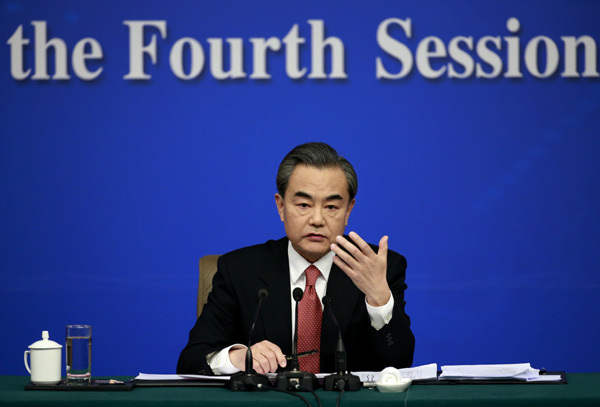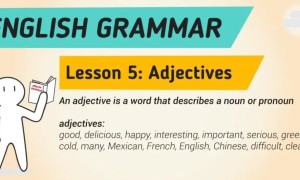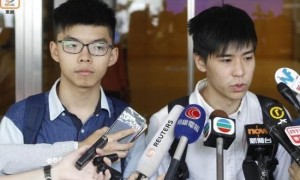|
Chinese Foreign Minister Wang Yi takes questions from the press during a news conference on the sidelines of the two sessions on Tuesday. [Photo by Feng Yongbin/chinadaily.com.cn]
|
十二届全国人大四次会议新闻中心于3月8日10时在梅地亚中心多功能厅举行记者会,邀请外交部部长王毅就“中国的外交政策和对外关系”的相关问题回答中外记者的提问。
以下是王毅外长回答记者提问时的一些金句摘录。
>>有关G20
我们将着力从三个新的角度来寻求峰会的突破。一是以创新发掘新动力。二是以改革注入新活力。三是以发展开辟新前景。
We will try to break new ground from three new angles: first we want to discover new sources of growth for innovation, second, we want to inject new momentum to the world economy through reform, and third, we want to explore new prospects through development.
让G20从杭州再出发,让世界经济从中国再出发。
Hangzhou will be a new launch pad of G20, and China will be a new launch pad for the world economy.
>>有关对朝制裁
制裁是必要手段,维稳是当务之急,谈判是根本之道。
Sanctions are just a necessary means, maintaining stability is the pressing priority, and only negotiation could provide a fundamental solution.
>>有关中国外交
中国特色大国外交的努力目标是助力民族复兴的“中国梦”和建设人类命运共同体。
The goal of major-country diplomacy with Chinese characteristics is to help realize the Chinese dream of national rejuvenation and build a community of shared destiny for all mankind.
>>有关南海问题
航行自由并不等于横行自由,如果有人想把南海搅浑,把亚洲搞乱,中国不会答应,本地区绝大多数国家也不会允许。
Navigation freedom does not mean "doing whatever you want" in South China Sea. If someone wants to muddy the waters in the South China Sea and to destabilize Asia, China will not agree to it and I think the majority of countries in the region will not allow that to happen.
>>有关菲律宾南海申诉案
有人兴风作浪,还有人炫耀武力......历史终将证明,谁只是匆匆过客,谁才是真正的主人。
Some people are trying to make waves (in the South China Sea) and some others are showing their forces... History will prove who is merely a guest and who is the real host.
>>有关中朝关系
中国既重情义,也讲原则。我们珍视同朝鲜的传统友好,朝鲜要谋发展、求安全,我们愿意提供支持和帮助。但同时,我们坚持半岛无核化的立场毫不含糊,对朝方推进核、导计划,我们不会迁就。应该清楚地看到,无核才能和平,对话才是出路,合作才能共赢。
China both values friendship and stands on principles. We cherish our traditional bonds with the DPRK. If the country seeks development and security, we are prepared to help and provide support. But at the same time, we have an unwavering commitment to the denuclearization of the Korean Peninsula, and we will not accommodate the DPRK's pursuit of nuclear and missile programs. One should see very clearly that only denuclearization could bring peace, only dialogue could provide a way out and only cooperation can bring win-win outcomes.
>>有关中美关系
中美作为两个大国,既有合作,也有摩擦,这可能是一个常态。
China and the US are two major countries, and there is both cooperation and friction. this might be a normal state of affairs.
>>有关中俄关系
中俄关系是成熟、稳定的。我们的全面战略协作伙伴关系建立在相互支持、相互信任的牢固基础上,也有着加强合作、互利双赢的巨大需求,完全经得起任何国际风云的检验,不会因一时一事而改变。
The China-Russia relationship is mature and stable. Our comprehensive strategic partnership of coordination is built on a solid foundation of mutual support and mutual trust. The two sides have a strong desire to strengthen win-win cooperation. The relationship can pass the test of any international development and will not be weakened by any particular incidents.
>>有关“一带一路”
“一带一路”倡议是中国的,但机遇是世界的。
The Belt and Road Initiative is China's idea, but the opportunities it has created belong to the world.
>>有关中东政策
中国在中东不搞势力范围,也不寻求代理人,我们要做的,就是本着客观公正态度,着力劝和促谈,光明磊落、坦坦荡荡。
China's policy on the Middle East is to facilitate peace talks with an objective and impartial attitude, instead of seeking a sphere of influence or proxies.
>>有关海外领事保护
非常坦率地讲,我们资源有限,手段不足,能力建设亟待加强。
To be honest, our resources and tools are limited and our capacity not yet up to the task.
事先预防而非事后补救,才是最好的办法。预防性领保是我们今后工作的方向。
The best approach is prevention beforehand rather than remedy afterwards, so we will focus more on preventative consular protection.
>>有关中日关系
日本政府和领导人,一方面不断地声称要改善日中关系,一方面又不断到处给中国找麻烦。这实际上是一种典型的“双面人”的做法。
On one hand, the Japanese government and leaders say all the nice things about wanting to improve relations, but on the other hand, they are making trouble for China at every turn. This is what I would call a typical case of "double dealing".
对中日关系而言,病根就在于日本当政者的对华认知出了问题。面对中国的发展,究竟是把中国当作朋友还是敌人?当做伙伴还是对手?日方应该认真想好这个问题,想透这个问题。
As far as China-Japan relations are concerned, the underlying problem is that some politicians in Japan have the wrong perception about China. Do they view China as a friend or foe? As a partner or an adversary? The Japanese side should give serious thought to this question and make the right choice.
>>有关中欧关系
中欧关系的积极变化不是一时之计,而是长远和必然的选择。
Positive changes in the China-Europe relations are not a temporary phenomenon but an inevitable choice in the long run.








